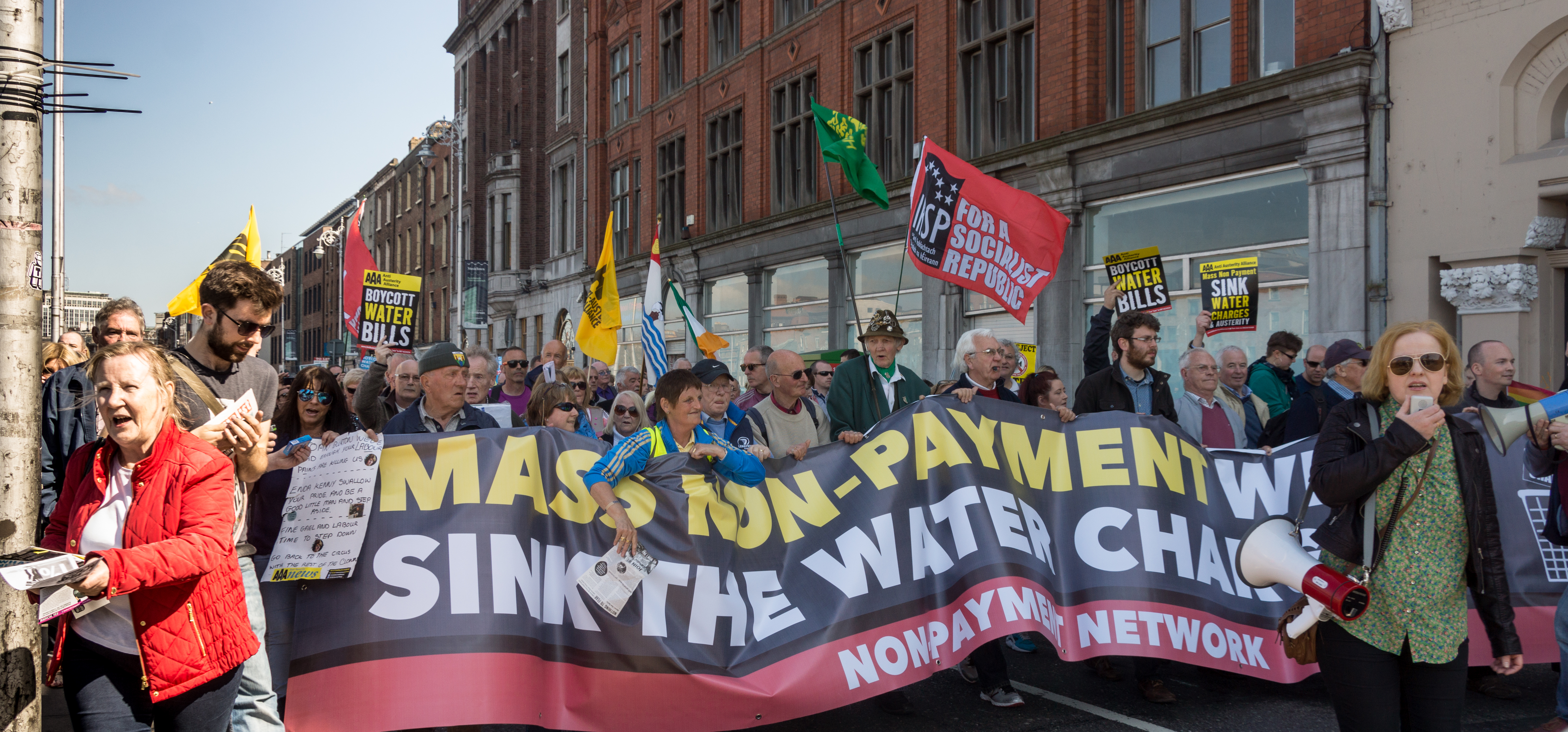
Image: William Murphy via Creative Commons
Domestic water charges might seem an unlikely issue to mobilise a nation. But in the Republic of Ireland, water charging has provoked mass protests not seen in the country for decades. The policy was instrumental in bringing down the last Irish government and may well be a deciding factor in the formation of the next. And although some elements in the story are unique to Ireland, the introduction of water charges has lessons for central and local government elsewhere.
A controversial policy
The roots of the problem lie in 2010, when Ireland had to accept an €85 billion loan from the International Monetary Fund after the collapse of almost all of the country’s big private financial institutions. One of the bailout conditions was a restructuring of the water sector and the introduction of domestic water charges before the end of 2013.
Since the formation of the Irish state, costs for water supply and treatment have been covered through the central taxation system and water charges on businesses. But in 2013, the government established a new water utility company – Irish Water – to take over the control of infrastructure and distribution from local authorities, and to collect water charges. The pricing model adopted by Irish Water was confusing, but indications were that the average annual cost per household would be between €278 and €584.
Irish Water’s first few months of operations were dogged by a series of controversies concerning data protection, bonus payments to staff and wasteful expenditure that undermined the new body’s credibility. At the same time, although the government said there were no plans to privatise Irish Water, opponents of the scheme expressed concern that the utility company could prove attractive to commercial buyers.
The public response
Coming on the back of four years of public sector cuts and additional taxes, the water charges were deeply unpopular. While some objected to the principle of paying for water, others felt they were being made to pay twice, both through taxation and the new charges.
Throughout 2014 and 2015, thousands of people took part in mass demonstrations in the biggest public backlash against government policy for many years. At one demonstration, the deputy prime minister’s car was surrounded by protesters for almost three hours. Smaller-scale, but no less heated protests prevented Irish Water workers from installing water meters. The rebellious mood was not confined to the streets. The first bills were sent out at the start of 2015, but by the summer it was clear that less than half of Irish Water customers had paid up.
A vote-losing policy
Water charging was a significant issue during last month’s Irish general election campaign. The coalition government defended the policy, while the main opposition parties called for water charges to be scrapped.
After an inconclusive election result, the future of water charging now hangs in the balance. The horse-trading between Ireland’s political parties means water charges will be up for discussion among politicians hoping to form a government.
But even if agreement on scrapping the charges is reached, proceeding from there may not be straightforward. Abolition could be in breach of the IMF loan conditions and could also lead to fines from the European Commission. At the same time, money still has to be found to maintain the country’s water supply, to repair Ireland’s decaying water infrastructure and to promote water conservation.
Lessons from across the Irish Sea
For some, the domestic water charges may appear to be an Irish stew of maladministration, miscommunication and recrimination. But the policy reform contains lessons that could reverberate beyond Ireland.
Concerns about who supplies water in the Republic of Ireland are echoed in the UK, where different models of water provision exist in England, Wales, Scotland and Northern Ireland. The debate over whether public or private ownership provides the better service shows no sign of abating, and the uproar in Ireland demonstrates that water can be an emotive and explosive issue.
The shambolic reform of Ireland’s water sector has provoked such enormous resentment that the new system may ultimately cost more than it raises. Earlier this month, an opinion poll found that only 22% of respondents intend to pay their next water bill.
The Irish water charges controversy is a reminder to policymakers everywhere that public confidence in a policy can make it or break it.
Follow us on Twitter to see what developments in public and social policy are interesting our research team.
Share
Related Posts
Supporting residents on the decarbonisation journey: leveraging data for effective retrofit projects
As the drive towards decarbonisation intensifies, the social housing sector’s ability to collect, store and manage vast amounts of data becomes increasingly critical. With a shared goal of creating warmer, carbon-free homes, housing associations’ strategic use of data is essential ....
The recent spikes in energy costs have thrown into sharp focus the challenge of heating our homes. Domestic heating is important, not just for our comfort and wellbeing, but to reduce humidity and prevent condensation. But because traditional heating systems ....
Tackling geographical inequalities is critical for ensuring that all parts of the country have the potential to prosper. When the UK was a member of the European Union, it was entitled to a share of funding from the EU’s structural ....
In recent years, there has been an increasing focus on ensuring people with ‘lived experience’ are involved in co-producing research and policy-making at practical, local level. However, there has been little discussion around what the people with lived experience themselves ....
